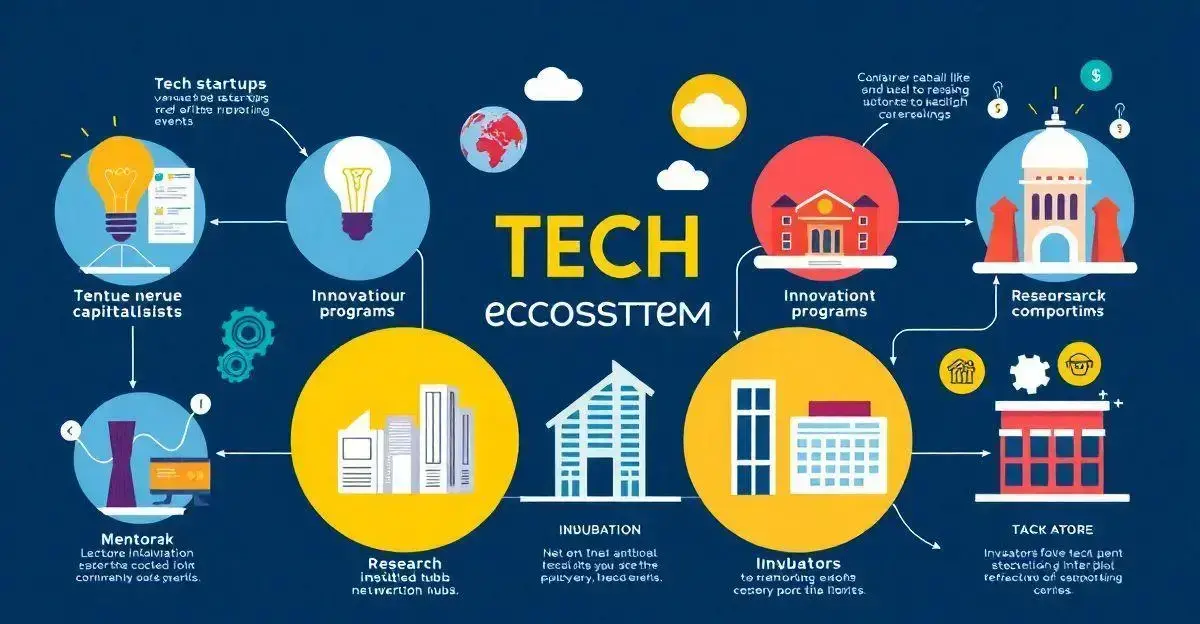The tech ecosystem is a vibrant network of technology companies, investors, and innovators that drive progress and growth.
In recent years, this ecosystem has expanded rapidly, creating numerous opportunities for startups and established businesses alike.
Understanding the dynamics of the tech ecosystem is essential for anyone looking to thrive in today’s digital landscape.
What is a Tech Ecosystem?
A tech ecosystem refers to the interrelated network of technology companies, investors, universities, and government agencies that collaborates to foster innovation and economic growth.
This ecosystem encompasses various entities, including startups, established firms, incubators, and accelerators. Each plays a crucial role in driving technological advancement and creating job opportunities.
Specifically, a tech ecosystem thrives in a supportive environment, where resources such as funding, mentorship, and networking are readily available.
Ecosystems emerge in urban areas with a concentration of talent, research institutions, and infrastructure that promote knowledge exchange.
The synergy created within a tech ecosystem not only enhances the growth of its individual members but also contributes to the overall economy.
Moreover, the interactions between companies in a tech ecosystem often lead to collaboration, allowing them to share ideas and resources that can accelerate product development.
This collaborative spirit fosters a culture of innovation, encouraging companies to experiment and take risks.
Understanding the concept of a tech ecosystem is vital for anyone involved in the technology sector.
It provides insights into how to effectively navigate and leverage the available resources for success.
Key Components of a Tech Ecosystem

Key components of a tech ecosystem include various entities that work together to stimulate innovation. These components comprise startups, established tech companies, investors, academic institutions, and support organisations. Each plays a distinct role in shaping the overall landscape.
Startups are often the driving force, bringing fresh ideas and technologies to market. They rely on established companies for mentorship and guidance as they grow. In turn, established firms benefit from the innovation that startups introduce.
Investment is crucial in a tech ecosystem; venture capitalists provide the necessary funding to help startups scale and flourish. Universities contribute by producing skilled graduates and engaging in research activities, which fuels new technological advancements.
Additionally, coworking spaces and incubators foster collaboration among these various entities, creating an environment conducive to networking, mentorship, and resource sharing.
In conclusion, the interaction between these key components is vital. Their collaboration drives innovation and supports an expanding tech ecosystem.
Benefits of a Thriving Tech Ecosystem
A thriving tech ecosystem offers numerous benefits that can enhance innovation and drive economic growth. One of the main advantages is the collaboration that occurs among various stakeholders, including startups, established companies, and educational institutions.
Firstly, a robust tech ecosystem fosters a culture of innovation by providing a platform for individuals to share ideas and resources. This collaboration often leads to the development of new technologies and services that can disrupt traditional markets.
Secondly, startups gain access to essential resources such as funding, mentorship, and expert advice, which are crucial for their growth. Investors benefit from these opportunities as well, as they can discover promising companies to back.
Another significant benefit is the creation of employment opportunities. As tech companies grow within the ecosystem, they seek to hire skilled professionals, contributing to local job markets.
Lastly, a thriving tech ecosystem attracts talent from various regions. This influx creates a diverse and inclusive environment that encourages different perspectives, further enriching the innovative process.
Challenges Facing Tech Ecosystems

Tech ecosystems face several challenges that can hinder growth and innovation.
Access to funding is one of the primary obstacles. Many startups struggle to secure investments, limiting their ability to scale and develop groundbreaking technologies.
Another critical issue is the shortage of skilled talent. The rapid pace of technological advancement often creates a skills gap, making it difficult for employers to find qualified individuals for specialized tech roles.
Regulatory barriers also present significant challenges. Strict or unclear regulations can stifle innovation, complicate the legal landscape, and discourage new startups from entering the market.
Competition is another factor impacting tech ecosystems. While competition can spur innovation, an oversaturated market can lead smaller companies to struggle for survival, ultimately affecting the ecosystem’s overall health.
Finally, maintaining strong collaboration among stakeholders is essential. A breakdown in communication and partnerships can weaken the support systems necessary for fostering growth and innovation.
Case Studies of Successful Tech Ecosystems
Case studies of successful tech ecosystems offer valuable insights into fostering collaboration and innovation.
Silicon Valley stands out as a global hub for technology. Startups thrive here due to the availability of venture capital, a pool of skilled talent, and proximity to renowned universities, creating a dynamic environment for growth.
Tel Aviv is another notable example, earning international recognition for its vibrant tech scene. With a high number of startups per capita, the city benefits from strong military technology programs that drive innovation and entrepreneurship.
Berlin has also emerged as a leading European tech hub. The city attracts a diverse range of tech companies and offers active support networks that provide essential resources for startups, fostering a thriving culture of innovation.
These ecosystems highlight the critical role of partnerships, funding, and resource availability in building successful tech environments. By combining these elements effectively, they achieve remarkable growth and create abundant opportunities.
Future Trends in Tech Ecosystems

Future trends in tech ecosystems indicate a shift towards increased integration of advanced technologies. As digital transformation accelerates, businesses are expected to adopt AI, machine learning, and automation more widely, enhancing operational efficiency and decision-making.
Moreover, there is a growing emphasis on sustainability. Tech ecosystems will increasingly focus on developing eco-friendly solutions and reducing carbon footprints. This trend can lead to innovations in clean technology and renewable energy.
Another emerging trend is the rise of remote collaboration. As more companies embrace remote work, tech ecosystems will adapt by providing tools that facilitate seamless communication and project management across distributed teams.
Furthermore, the integration of blockchain technology in various sectors is expected to increase, enhancing transparency and security in transactions. This could support the development of trust-based relationships within the ecosystem.
Lastly, diversity and inclusion will play a crucial role. Tech ecosystems are recognising the importance of diverse perspectives in driving innovation and are working towards creating inclusive environments that attract talent from all backgrounds.
How to Engage with Your Local Tech Ecosystem
Engaging with your local tech ecosystem is essential for fostering innovation and collaboration. Start by attending networking events and meetups where you can connect with like-minded individuals and potential partners. These events provide an opportunity to share ideas, learn about new technologies, and discover local startups.
Another effective way to engage is by joining local incubators or accelerators. These programs offer resources, mentorship, and support to help you grow your tech venture. Participating in these schemes not only enhances your knowledge but also expands your network.
You can also contribute to your local tech community by sharing your expertise through workshops or seminars. Teaching others can build your reputation and help develop a culture of knowledge sharing within the ecosystem.
Furthermore, consider collaborating with local universities. Many institutions seek partnerships with businesses to enhance their research and provide students with real-world experience. This collaboration can lead to innovative projects and fresh ideas.
Finally, engaging with local government initiatives that support technology and innovation can also benefit your efforts. Many regions have programs designed to enhance their tech environments, which you can leverage for support.
Engaging with Your Local Tech Ecosystem
In conclusion, engaging effectively with your local tech ecosystem is vital for fostering innovation and collaboration. Attending networking events, joining incubators, and sharing your expertise can significantly enhance your connections and visibility in the community.
By collaborating with local universities and participating in government initiatives, you can further contribute to the growth of the ecosystem. This mutual support helps create a thriving environment where startups and established companies can prosper together.
Ultimately, taking an active role in your tech ecosystem not only benefits you but also contributes to the overall health and innovation within the local technology landscape.
FAQ – Frequently Asked Questions about the Tech Ecosystem
What is a tech ecosystem?
A tech ecosystem is a network of technology companies, investors, and institutions that collaborate to foster innovation and growth.
How can I engage with my local tech ecosystem?
You can engage by attending networking events, joining local incubators, and collaborating with universities and government initiatives.
What are the benefits of participating in a tech ecosystem?
Participating in a tech ecosystem provides access to resources, expertise, and networking opportunities that can enhance innovation and business growth.
What challenges do tech ecosystems face?
Challenges include access to funding, a shortage of skilled talent, regulatory barriers, and maintaining collaboration among stakeholders.
How do case studies illustrate successful tech ecosystems?
Case studies highlight how cities like Silicon Valley and Tel Aviv have built vibrant tech ecosystems through collaboration and support.
What future trends can we expect in tech ecosystems?
Future trends include increased integration of advanced technologies, a focus on sustainability, and the rise of remote collaboration tools.
